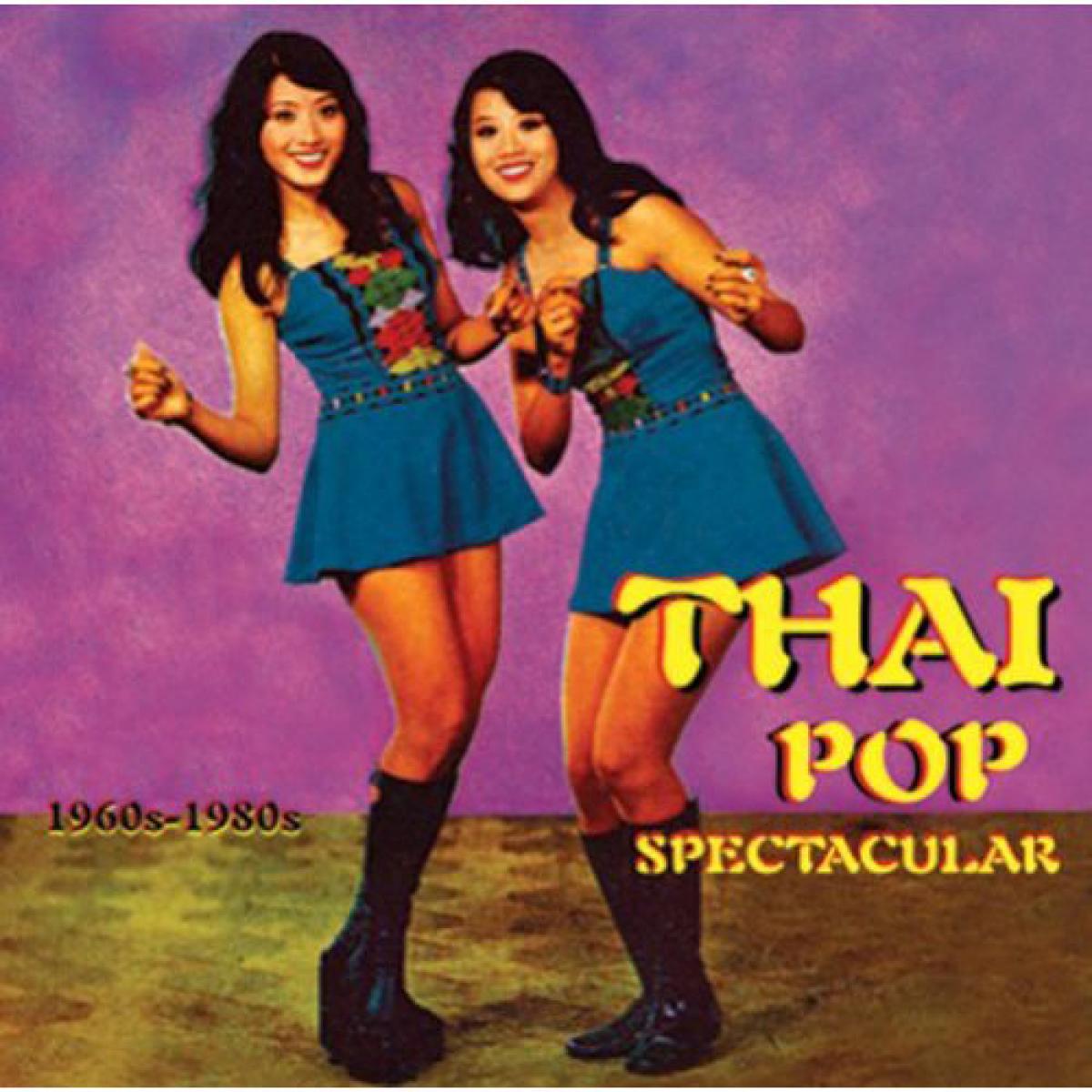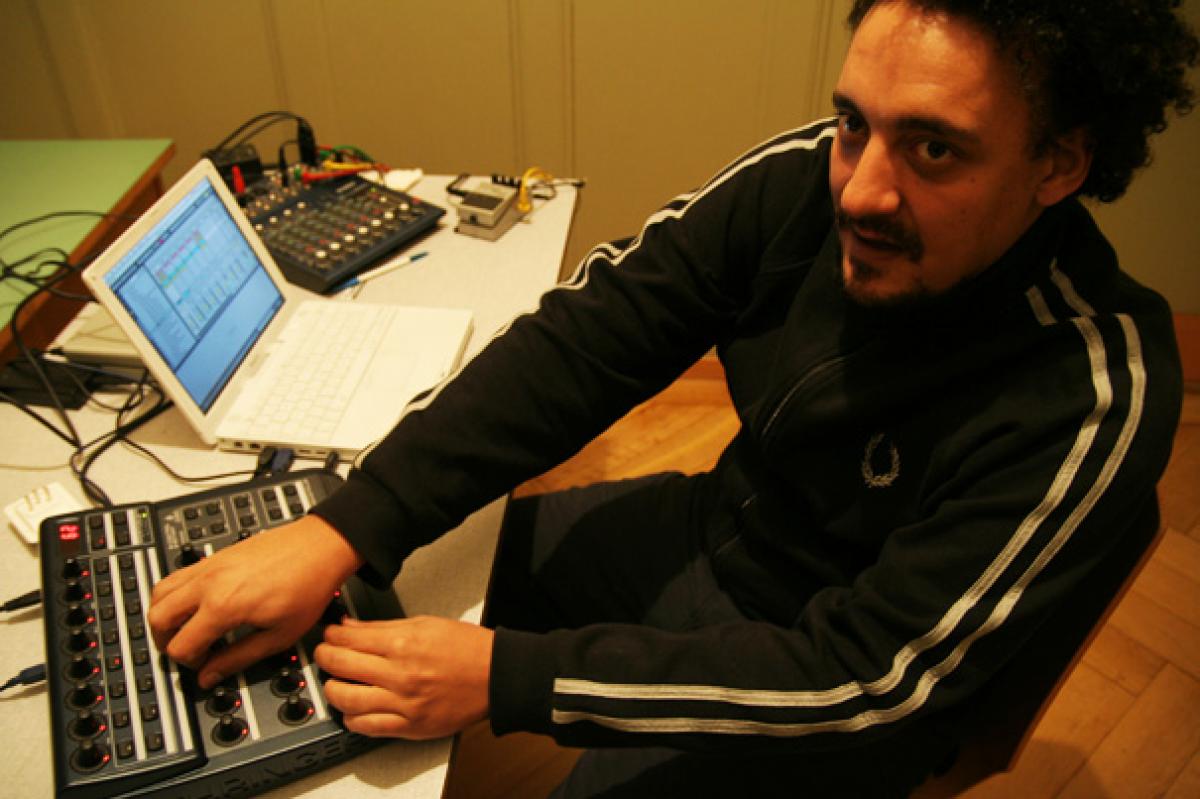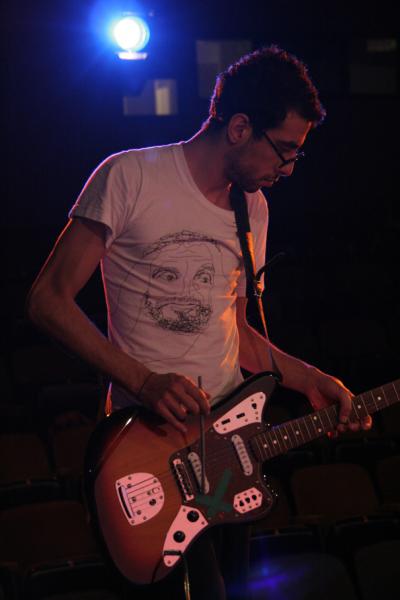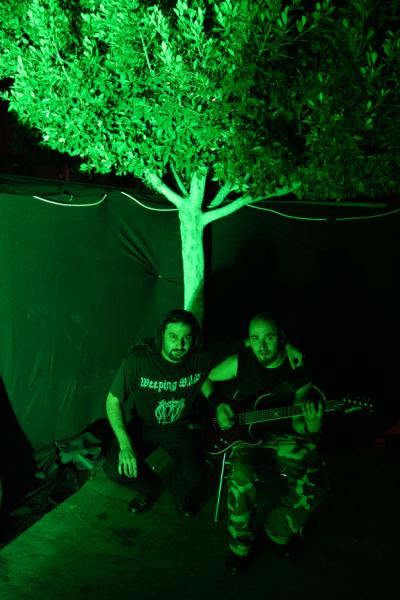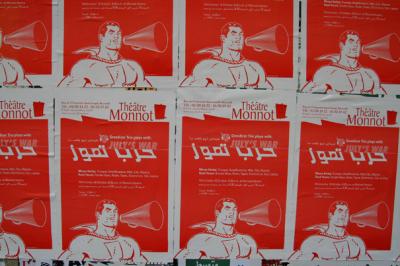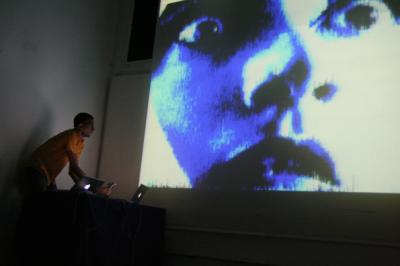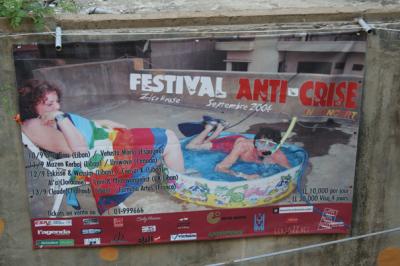In der zeitgenössischen Musik der arabischen Welt werden «Authentizität», «Herkunft» und «Lokalität» nicht nur durch Instrumente und Klangfolgen evoziert – es gesellen sich Geräusche und akustische Erinnerungen hinzu.
Ein Imperium hat er sich noch nicht gerade aufgebaut, aber Mahmoud Refat kann heute zumindest von seiner Kunst leben – auch wenn er seine CDs nur in einer Auflage von hundert Stück auf den Musikmarkt streut. Soundkünstler Refat lebt meistens in Kairo. Dort betreibt er sein Musiklabel «100copies». Ich habe Refat 2003 während einer Recherche über subkulturelle und experimentelle Musik zum ersten Mal getroffen. Er zeigte mir seinen Stapel Mini- Discs voller Feldaufnahmen aus Ägypten: Strassengeräusche, das Plätschern des Wassers in einer Oase, ein Sandsturm in der Wüste. Daneben lag ein Haufen Mikrofone. Die habe er alle selber gebaut, sagte er: «Jede der Soundlandschaften habe ich mit einem speziellen Mikrofon eingefangen.»
Ein Jahr später arbeitete Refat auf Einladung der Kulturstiftung Pro Helvetia drei Monate in der Schweiz, wo er auf den Klangforscher und Installationskünstler Zimoun traf. Auf dessen Label «Leerraum» veröffentlichte Refat seine erste CD Shift (2004), inzwischen folgten weitere Alben. Die Abreise aus der Schweiz gestaltete sich unerwartet schwierig: Refats Koffer, vollgestopft mit den neuesten Sound-Geräten und Kabeln, waren beim Check-in in Zürich zu schwer und dem Zoll in Ägypten suspekt – entschlossen seine Karriere zu lancieren, hatte sich der Künstler mit viel zu viel Material eingedeckt.
Seit der Gründung von «100copies» organisiert Refat jährlich ein Festival für elektronische Musik und tritt an internationalen Medien-, Kunst- und Musikanlässen von Beirut bis Berlin auf. Sein Soundstudio besteht aus einem Apple-Laptopcomputer voller Spezialsoftware. Mit ähnlicher Ausrüstung arbeiten auch Hassan Khan, Charbel Haber, Raed Yassin und andere Soundkünstler in Kairo und Beirut. Die Software tauschen sie untereinander aus oder holen sie sich in irgendeiner kostenlosen Form aus dem Internet. Die Künstler der elektroakustischen Musik nutzen die neuen Möglichkeiten der digitalen Welt sehr gezielt.
Gut verstecktes Blutbad
«The ants have megaphones», schreibt Chris Anderson in seinem Buch The Long Tail (2007), das auf die wachsende Bedeutung kleiner und kleinster Nischen aufmerksam macht: Dank Internet und globaler Zugänglichkeit sind die Möglichkeiten zur Selbstdarstellung – auch zur kommerziellen – für alle stetig gewachsen. Das ist der aktuellen Generation von Musikern und Künstlern in der arabischen Welt nicht verborgen geblieben. Sie gestalten mit Anleihen aus dem Westen eigene Kreationen und Sound-Erinnerungen und legen Wert darauf, dass es sich um arabische Musik handelt. Mit ihren neuen ästhetischen Formen stellen die Künstler damit auch die herkömmliche Definition von «Lokalität» in Frage. Die Szene ist sehr vielfältig. Checkpoint 303, das Netzwerk Ramallah Underground und die Rapper DAM mischen in Palästina Rap, elektroakustische Experimente und Feldaufnahmen zu politisch brisanten Botschaften. Dank ihrer Websites werden die Gruppen weltweit wahr genommen. Das Label «Those Kids Must Choke» des Gitarristen Charbel Haber produziert in Libanon experimentellen Lo-Fi-Rock.
Die Paradeband Scrambled Eggs spielt ihren improvisierten Noise und geradlinigen Punk dank guter Vernetzung auch auf amerikanischen Bühnen. Weeping Willow ist eine von vielen Metal Bands im Nahen Osten. Sie spielt abgrundtiefen Death Metal und schreibt ihre Songs auf Englisch. Die Lieder behandeln soziale und politische Themen – oft ziemlich versteckt. Das Stück «Remains of a Bloodbath» ist ein traumatisches Porträt von Beirut: eine wirre und verwirrende Zusammenstellung von Satzfragmenten und Wörtern wie «men at war», «dead in a bloodbath» oder «emptying your firing kit». Der Gitarrist und Anführer der Band, Garo Gdanian, erklärt: «Wir alle haben noch immer Albträume von unseren traumatischen Erlebnissen im libanesischen Bürgerkrieg. Wir sind aber auch fasziniert von Horrorfilmen und schauen sie rund um die Uhr. Unsere Musik ist deshalb halb real und halb fiktiv.» Und ergänzt: «Wir sind mental geschädigt, wie alle unsere Landsleute. Sie suchen Halt bei religiösen Führern und alten, korrupten und machtgeilen Clan-Politikern finden ihn aber nicht.»
Die Zensur hinkt hinterher
Andere arabische Künstler bekunden im Internet abweichende Meinungen zu ihren Regimes oder zur Weltpolitik. Wer von muslimhiphop. com oder von myspace.com/lethalskillz lossurft, taucht in eine transnationale Szene von Rappern ein, die im Guerilla-Look, aber im amerikanischem Slang die Vorzüge des Islam preisen. Daneben gibt es Provokationen wie die libanesische Black Metal Band Ayat, die auf ihrer Website erklärt: «Ayat unterstützt die völlige Vernichtung der Menschheit, die Misshandlung von Frauen, die Folterung derer, die es verdienen, und die Verstümmelung quer durch alle Nationen, Religionen und Rassen der Erde.» Die Zensurbehörden arabischer Staaten hinken der Entwicklung oft hinterher. Aber nicht immer: Xardas aka 20SV experimentiert in der libanesischen Stadt Tripoli seit einigen Jahren mit abstrakten Frequenzen und Noise. Die Polizei wurde auf seinen «Krach» aufmerksam, bezichtigte ihn des Satanismus und räumte sein Haus. Mit der Konzentration auf globale Nischenmärkte sind viele Einschränkungen überwindbar: Weil Refats «100copies» so klein ist, nimmt die sonst strenge ägyptische Zensurbehörde das Label nicht allzu ernst. Es besitzt keine Lizenz zum CD-Verkauf in ägyptischen Läden, braucht sie aber auch nicht, denn die CD dient in erster Linie der Promotion. Refat verschickt sie weltweit und hofft auf Aufträge für Konzerte, finanzierte Projekte und Co-Produktionen mit ausländischen Soundkünstlern. Um seine CDs zu exportieren, muss Refat jeweils selbst bei der Zensurbehörde vorsprechen. «Ein Beamter hört sich die CD in seinem Büro an. Befindet er sie gut für den Export, packt er das DHL-Paket gleich selber und sichert es mit einem offiziellen Metalldraht. So kann ich beim Verschicken keine weiteren Waren hinzupacken.»
Die neuen Nischenstars aus der arabischen Welt haben sich international gut vernetzt. Sie formieren sich zu transnationalen Wissens- oder Geschmacksgemeinschaften und revolutionieren auf diese Weise das Musikgeschäft. Dank Internet sind sie vom Zwang befreit, eigene und fremde Werke auf physischen Datenträgern zu verschicken. Und sie können heute nicht mehr bloss über die neuesten Trends lesen, sie können diese Musik endlich auch hören. Der israelische Musikwissenschaftler Motti Regev bemerkte 2007 dazu, dies führe zu einem neuen «emotionalen Wissen» und präge die Musikszene an der vermeintlichen Peripherie der Welt.
Wenn ein Jingle die Hörer schockt
Zu den neuen Soundkünstlern gehören Mazen Kerbaj und Raed Yassin in Beirut. Beide sagen deutlich, dass ihre stilistischen Haupteinflüsse aus Europa und den USA stammen. Kerbaj nennt als erstes prägendes Musikerlebnis das Album Machine Gun – Automatisches Gewehr zum schnellen und kontinuierlichen Abfeuern des deutschen Freejazzers Peter Brötzmann. Weiteren Vorbilder sind Freejazzer und Pioniere der Freien Improvisierten Musik wie etwa Albert Ayler, Evan Parker, Michel Doneda, Vinko Globokar, Axel Dörner und Franz Hautzinger. Das Gestell von Yassin in Beirut ist gefüllt mit CDs zeitgenössischer Komponisten von Karlheinz Stockhausen über Iannis Xenakis bis zu den Pionieren der Musique Concrète, Pierre Schaefer und Luc Ferrari. Yassin hört aber, im Gegensatz zu Kerbaj, auch arabische Musik: libanesische Rockmusik und Jazz-Rock aus den 1960er- und 1970er-Jahren und den ägyptischen Gitarristen Omar Khorshid, der den Surf-Gitarrenstil aus San Francisco mit den Rhythmen des Bauchtanzes verband. Die beiden Künstler arbeiten mit Themen oder akustischem Material aus ihrer lokalen und regionalen Umgebung. Besonders deutlich wird dies in den audiovisuellen Arbeiten von Yassin. In seiner zwanzigminütigen Sound-Collage CW Tapes verarbeitet er Tonmaterial aus seiner Kindheit: Propagandalieder, die politischen Reden der verschiedenen Fraktionen, dazu Radiojingles, Werbelieder, Pop-Hits aus dem Krieg und alte Tonaufnahmen aus der Stadt. All das vermischt er zu einem kontroversen Stück Ton- und Zeitgeschichte. «Diese akustischen Erinnerungen aus dem Bürgerkrieg haben sich tief in unser Gedächtnis eingebrannt. Sie bleiben frisch und sind jederzeit abrufbar, auch wenn viele Libanesen alles daransetzen, sie zu verdrängen oder auszuradieren», sagt Yassin. Wenn er seine Sound-Collage Hörern in Beirut vorspielt, reagieren diese oft geschockt. Besonders der News-Jingle aus dem Radio von damals lässt sie aufschrecken: Denn wann immer diese Erkennungsmelodie das Programm unterbrach, war wieder etwas Schreckliches geschehen. Der Jingle ist übrigens auch im Westen bekannt – in einem ganz anderen Zusammenhang: Er stammt aus dem Soundtrack des amerikanischen Actionfilms Shaft (Gordon Parks, 1971), geschrieben von Isaac Hayes.
Authentische Ohren
Das Ohr spielte im Krieg eine wichtige Rolle, dies betonen viele Libanesen ungefragt. Yassin und Kerbaj erkennen noch heute alle Kriegswaffen am blossen Geräusch. Sie hören, von wo nach wo eine Rakete zischt. Sie wurden zudem von den zweihundert Radiosendern geprägt, die während des Krieges nonstop gehört wurden und auf denen jede Kriegsmiliz berichtete, wer getötet worden war, welche Strassen offen waren und welche man meiden sollte. Unter Musikern macht inzwischen die sarkastische Frage die Runde: «Schärft der Krieg das Gehör?»
Kerbaj experimentiert auf seinem jüngsten Soloalbum brt vrt zrt krt t mit den ungewöhnlichsten Geräuschen, die er seiner Trompete entlockt. Vor Jahren hatte Hautzinger zu ihm gesagt: «Deine Trompetensounds klingen wie Helikopter und Maschinengewehre. » Das wühlte Kerbaj auf: «Ich ging zurück zu meinen frühen musikalischen Einflüssen und fragte mich: Warum habe ich gerade die CD Machine Gun von Brötzmann so sehr gemocht?» Es ist die Frage nach dem Einfluss des akustischen Inputs aus der Kindheit auf das spätere Werk eines Künstlers. «Ich habe eine spezielle Beziehung zur Stille», erzählt Kerbaj, «ich hatte immer grosse Angst davor. Denn wenn es still war, warteten wir immer auf den nächsten Bombenhagel.»
Die Übertragung der Kindheits-Geräuschwelt in die Musik eines Künstlers geschieht sowohl bewusst wie unbewusst. Für das Unterbewusste erklärt die Sound-Psychologie und -Sozialogie, dass die ersten Lebensjahre prägend sind für unsere Fähigkeiten, Sound zu hören, zu geniessen und später damit zu arbeiten. Viele dieser Fähigkeiten, fand der Musikforscher Leonard B. Meyer heraus, sind tief in der Persönlichkeit eines Musikers verborgen und bilden den «Kern» seiner Musik. Durch diese biografische Prägung wird sie etwas sehr Persönliches. Die bewusste Ebene dagegen zwingt uns, nicht-musikalische Faktoren in Betracht zu ziehen. Es fällt auf, dass Kerbaj die Beziehungen seiner Musik zu den Kriegsgeräuschen erstmals in einem Interview mit einem ausländischen Journalisten thematisierte. «Zuerst lachten meine Freunde und ich über meine Antwort», sagt er. – Handelte es sich vielleicht nur um eine Strategie, die bohrenden Fragen der Journalisten, Geldgeber und Musikschüler nach «Authentizität» ein für allemal auszuräumen? «Je länger ich darüber nachdachte, desto klarer wurde mir, dass es sich um weit mehr als einen Witz handelte.» Die Werke von Kerbaj und Yassin lassen sich als Audio- Erzählungen hören und interpretieren. Dabei hören wir nicht nur ihre aktuelle Umgebung, sondern auch, wie sie sich selber im lokalen und globalen Zusammenhang positionieren: Es sind Insidergeschichten über das Leben und Arbeiten zweier Künstler im Libanon des 21. Jahrhunderts.
Opfer der Geschichte
Musik wird auf verschiedene Weisen gehört und verstanden, abhängig vom Hintergrund des Zuhörers, seiner Position und seiner Persönlichkeit. Die Interpretation ist deshalb eine Herausforderung – ich erlebte während meines Aufenthalts in der arabischen Welt eine ganze Reihe davon. Auch wenn die Künstler kulturelle Klischees vermeiden und im Gespräch immer wieder betonen, dass sie die Vorliebe für «kulturelle Differenz» von Europäern, Musikethnologen und Weltmusik-Produzenten nicht befriedigen wollen, ist das nur zum Teil ein bewusster Entscheid. Zum anderen sind diese Musiker, die sich selber gerne als Individualisten geben, ganz einfach auch Opfer der libanesischen und arabischen Geschichte. Die historische Perspektive ist eine von mehreren Erklärungen dafür. Demnach folgen die Musiker einem Trend von arabischen Modernisten und Intellektuellen, die seit einigen Jahren die kulturellen Formen der arabischen Welt heftig kritisieren. Die Kritik zielt darauf, dass die arabische Musik ausschliesslich emotional gesteuert sei. Gerade Intellektuelle kritisieren ihre endlosen Wiederholungen und das andauernde Zirkeln um einige wenige Zentraltöne als rational unterentwickelt. Sie vergleichen die arabische Musik mit der arabischen Politik: Auch diese wiederhole sich endlos und käme nie auf den Punkt. Inzwischen unterrichten fast sämtliche Musikschulen und Konservatorien nach europäischen Lehrmethoden. Die arabische Musik wird heute von grossen Orchestern gespielt und nur noch selten von kleinen Ensembles. Die Heterophonie in untemperierten arabischen Vierteltonskalen weicht oft simpler Harmonik. Die Improvisation ist fixen Melodien gewichen, und die Musik wird in grossen Konzertsälen gespielt – für eine «mehrheitlich dekadente hohe Gesellschaft», das jedenfalls finden Kerbaj und Yassin. Die Folge: Viele Musiker der äusserst vitalen Beiruter Subkulturszene interessieren sich wenig für die arabische Musik und wissen auch wenig über sie. Und auch wenn sie diese am Nationalen Libanesischen Konservatorium erlernen wollen, lernen sie nicht all ihre ästhetischen Dimensionen kennen.
Sinn im Chaos
Die psychologische Perspektive bietet andere Erklärungen. Man könnte argumentieren, dass die Künstler die Musik für die Selbsttherapie ihrer traumatischen Kriegserfahrungen benutzen. Musik ist zwar keine Flucht aus dem «realen» Leben, aber eine Möglichkeit, die menschlichen Erfahrungen zu ordnen und Sinn ins Chaos zu bringen – das sagte der 2001 verstorbene britische Psychiater Anthony Storr. Das könnte gut auf Mazen Kerbaj zutreffen. Auf einer soziopolitischen Ebene könnte man behaupten, dass Kerbaj, Yassin und ihre Kollegen einen Kampf für die Veränderung im Libanon führen. Sie tun es mit nicht-kommerzieller und nicht-programmatischer Musik in einer konsumorientierten und politisierten Gesellschaft. Mit der Thematisierung des Bürgerkriegs nähern sie sich zudem einem Tabu: Es war für Yassin alles andere als einfach, etwa das akustische Archiv der verschiedenen Milizen zusammenzustellen, und es brauchte Mut, ihnen die fertigen CDs zuzustellen. Diese Künstler versuchen, eine starke persönliche musikalische Identität zu schaffen, jenseits von Selbst- Exotisierung, Propaganda und Kommerz. Ihre Musik ist verwurzelt in ihrem unmittelbaren Umfeld, aber offen gegenüber dem Rest der Welt.
Die nüchtern-globale Sicht wiederum zeigt Musiker, die in ihren Nischenkulturen äusserst kompetent agieren. Sie wollen sich mit den Szenen der frei improvisierten und der elektroakustischen Musik weltweit messen – und zwar durch Qualität und nicht aufgrund ihrer exotischen Herkunft. Diese Musiker sind nicht «verwestlicht », wie einige Kritiker in Europa, den USA, aber auch im Libanon vorschnell urteilen. Sie interagieren bewusst und unbewusst, offen und versteckt mit ihrer Geschichte. Eine letzte Interpretation stammt von Yassin selber. Nachdem ich die verschiedenen Techniken des Editierens und der Soundmanipulation in seiner Arbeit analysiert hatte, fragte ich ihn, warum darin keine grundsätzliche ästhetische Idee zu finden sei, die das Stück zusammenhalte. «Das ist einer der Hauptunterschiede zur elektroakustischen Musik aus Europa», sagte Yassin. «Ich bin ein arabischer Künstler. Ich bin in einer chaotischen Welt aufgewachsen.»
Neudefinition des Lokalen
Die Wahrheit liegt irgendwo zwischen all diesen Sichtweisen. Die akustischen Erzählungen zwingen dazu, genau und aus verschiedenen Standpunkten hinzuhören und die Musiker nicht vorschnell einer Kategorie zuzuschlagen. Die Vielseitigkeit des Materials, der verwendeten Sounds, ihr Arrangement und die Verknüpfungen führen zum Kern ihrer Musik. Diese Prägung der Musik durch die Persönlichkeit und die Biografie des Künstlers muss gerade in einer globalisierten und digitalisierten Welt, in der jede Musik aus jeder möglichen Nische auf Mausklick bereitsteht, bei der Charakterisierung einbezogen werden. Ein Musiker wählt einen gewissen Stil vielleicht nur aus, um einen bestimmten Markt zu bedienen oder in den Genuss internationaler Förderung zu kommen. Seine bewusste Strategie ist kurzfristig. Im unbewussten Kern verändert sich sein Musizieren hingegen viel langfristiger. 2006, im Krieg zwischen Israel und der Hisbollah, nahm Kerbaj das Stück Starry Night auf seinem Balkon auf und stellte es als MP3-File ins Internet. Wir hören seine Trompete und die Explosionen in der Stadt. Er nannte das Stück «eine minimalistische Improvisation von Mazen Kerbaj (Trompete) und israelische Luftwaffe (Bomben)». Zwei Jahre nach dem Krieg ist Kerbaj nicht mehr glücklich über seine Aufnahme: «Lokalität sollte im Kern der Musik verborgen sein», sagt er. «Das Lokale laut rauszuposaunen macht eine Musik exotisch, oft oberflächlich, und meistens kurzlebig.»
In der zeitgenössischen Musik der arabischen Welt werden «Authentizität», «Herkunft» und «Ort» nicht mehr nur durch arabische Instrumente und Klangfolgen evoziert. Es gesellen sich Geräusche und akustische Erinnerungen hinzu. Eine steigende Zahl von Musikern fokussiert dabei auf die eigene Biografie. Sie kreieren ihre Musik, und es ist ihnen egal, ob sie für den Rest der Welt «arabisch» klingt oder nicht. Sie argumentieren, dass die arabische Identität in der Struktur, der Mischung und der Spielweise ihrer Werke enthalten ist. «Das ist unsere Art des Widerstands gegen den Niedergang der arabischen Welt», sagt der Soundkünstler Tarek Atoui. «Wir wollen Qualitätsmusik produzieren, und zeigen: Die arabische Welt hat mehr zu bieten als kommerziellen Pop und Terrorismus.»
So suchen beispielsweise der ägyptische Geiger Riad Abdel- Gawad, der in Bern lebende libanesische Oud-Spieler, Gitarrist und Komponist Mahmoud Turkmani oder auch das Ensemble Thilges aus dem Kanon der arabischen Musik heraus neue Wege. Die Palästinenserin Kamilya Jubran und der Berner Werner Hasler bringen arabischen Gesang mit differenzierter Elektronika zusammen. Die ägyptische Sängerin und Tänzerin Karima Nayt, das libanesische Duo Soap Kills und die Londoner DJ-Kollektive MazaJ und dajjah bringen neue Sounds in die Clubs in West und Ost. Sie alle verarbeiten lokale und globale Einflüsse zu eigenständiger Musik und agieren weitgehend unabhängig von den Marketingideen des Mainstreams. Ihre Musik kommt den Stereotypen und Orientalismen, mit denen die arabischen Länder ständig konfrontiert werden, um viele Takte oder Zeiteinheiten zuvor.
Selbstbewusstsein im globalen Rahmen
Die meisten Mitglieder dieser losen globalen Bewegung von Soundkünstlern und Musikern leben an den vermeintlichen Rändern der Welt, oder sie sind von diesen nach Europa oder in die USA migriert. Aber sie werden immer selbstbewusster. Noch vor ein paar Jahren habe ich bei zahlreichen Reportagen als Musikjournalist in Belgrad, Kairo, Bamako oder Istanbul vor allem Frustration vorgefunden. «Wir haben bloss Chancen auf eine internationale Karriere, wenn wir unsere Musik mit den Melodien und Rhythmen der Roma-Musik kreuzen», erklärten etwa Rapper, Freejazzer und Elektronika-Produzenten in Belgrad. Inzwischen setzen sie sich aber – wie Kerbaj und Yassin – immer stärker durch: Für sie ist «Authentizität» nicht zwingend an die «traditionelle» Musik der Region geknüpft, dafür umso mehr an die Umweltgeräusche der Gegenwart oder ans persönliche akustische Gedächtnis. Leider werden sie dabei wenig gefördert. Der Welt musik- Markt ist heute in erster Linie ein Geschäft – wenn auch kein besonders lukratives. Die Institutionen der Kulturförderung setzen im Ausland gerne entweder auf grosse Repräsentationsprojekte, oder sie fördern vor allem eigene Musiker und bringen sie mit Musikern aus fernen Ländern zusammen, die anders klingen und musikalische «Differenz» produzieren. Solange die traditionellen Medien von Dubai bis Beirut ausschliesslich auf kommerzielle Produkte setzen und eine Kulturförderung nicht oder höchstens in Ansätzen funktioniert, müssen sich Künstler wie Refat weiter nach Europa und in die USA ausrichten. Refat kann nach Europa fliegen, wenn seine Reise direkt oder indirekt von einem ausländischen Kulturförderer bezahlt wird. Er bekommt sein Visum, wenn er in Ägypten kein rotes Tuch ist und ein Veranstalter in Europa für ihn bürgt. Während der virtuelle Raum diesen Musikern weit offen steht, wird das Reisen über reale Grenzen seit 9/11 aber immer schwieriger. Die Unabhängigkeit, welche das globale Netz suggeriert, ist in der realen Welt noch längst nicht gegeben.
